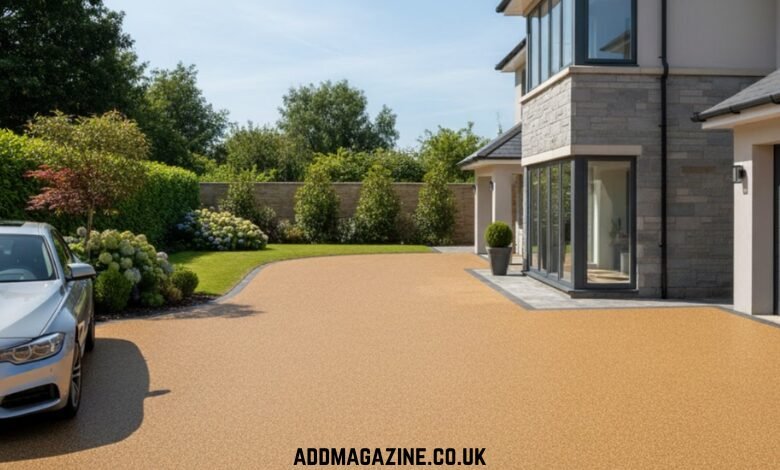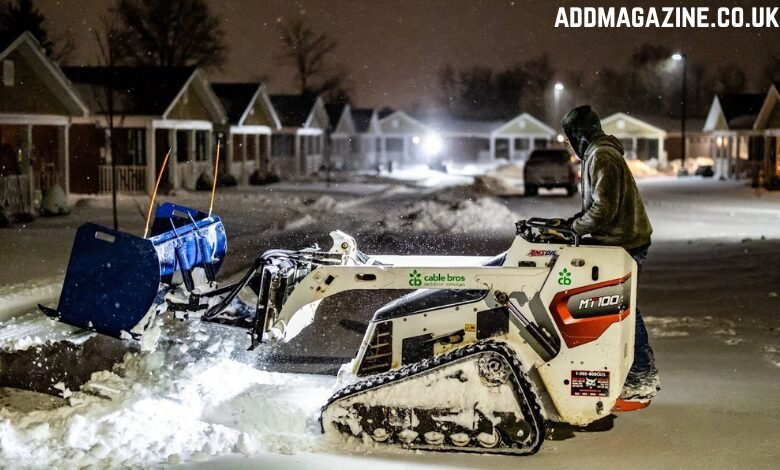Resin driveways have transformed British homes with their stunning appearance and durability. Yet many homeowners face premature cracking, poor drainage, and costly repairs due to avoidable installation errors.
Understanding common mistakes like inadequate base preparation, incorrect resin mixing, and rushing the curing process can save thousands in future repairs.
This guide reveals the most critical errors that compromise resin driveway longevity and provides proven solutions to ensure your investment delivers lasting beauty and functionality.
Whether planning a new installation or addressing existing issues, you’ll discover essential tips to avoid the pitfalls that plague countless UK driveways.
Key Mistakes Homeowners Make With Resin Driveways in the UK – And How to Fix Them?
Avoiding installation errors starts with understanding what goes wrong most often.
Ignoring Proper Ground Preparation
Poor groundwork stands as the number one cause of resin driveway failure across the UK. Some installers apply resin directly to uneven or unstable surfaces, which inevitably leads to sinking and cracking within months. The foundation must be thoroughly excavated, leveled, and compacted to provide a stable base that can withstand heavy loads and weather conditions.
A sturdy, compacted base forms the cornerstone of any long-lasting driveway. Without proper preparation, even the highest-quality resin will eventually crack and break apart. Professional contractors ensure the sub-base depth meets minimum requirements, typically 150mm for driveways, and use mechanical rollers to create a firm foundation.
When considering resin bound driveways in Hertfordshire or any UK location, always verify that contractors prioritize comprehensive groundwork. This initial investment prevents costly repairs and ensures decades of reliable performance.
Applying Resin Over Damp Surfaces
Laying resin on wet tarmac or concrete ranks among the most common installation mistakes. At first glance, the surface may appear acceptable, but trapped moisture beneath causes surface peeling, white discoloration patches, and premature deterioration.
Professional installers constantly monitor moisture levels and schedule installations around weather forecasts to ensure clean, even curing. The surface must be completely dry before resin application begins. Even slight dampness can compromise the bond between resin and the base layer.
This error becomes particularly problematic during Britain’s unpredictable weather patterns. Homeowners should never pressure contractors to proceed when conditions aren’t optimal, regardless of scheduling pressures.
Using Incorrect Resin Mix Ratios
Precise resin mixing determines surface strength and longevity. Too much hardener or insufficient stone blend weakens the entire surface structure. Low-quality resin fails to bind properly, creating a porous, weak surface prone to cracking, stains, and rapid erosion.
Experienced teams mix with exact precision and consistency to achieve the ideal strength and finish every time. They use high-quality, UV-stabilized resin materials that resist harsh weather and heavy traffic. The permeable resin driveway cost in the UK reflects these premium materials, typically ranging from £60 to £100 per square meter.
Cheaper resin options might seem attractive initially, but they result in frequent repairs and premature replacement. Custom resin finishes require specialized expertise that only trained professionals can deliver reliably.
Drainage and Water Management Failures
Proper water management separates successful installations from problematic ones.
Neglecting Drainage Planning
A resin surface performs only as well as its drainage system. Without careful planning, water pools during heavy rainfall, especially on sloped driveways. This standing water accelerates surface deterioration and creates safety hazards during freezing conditions.
Professional contractors design every installation with appropriate falls and soakaways so water drains naturally and quickly. The permeable nature of quality resin bound surfaces allows water to pass through to the soil and stone underneath. This prevents puddle formation and contributes positively to environmental sustainability.
Many road surfacing contractors in Essex and throughout the UK now specialize in creating optimal drainage solutions for residential properties. They assess site topography and rainfall patterns to design systems that handle Britain’s often intense precipitation.
Insufficient drainage channels or improper slope calculations lead to water-related damage that shortens the driveway’s lifespan significantly. Homeowners should request detailed drainage plans before installation begins.
Installation Technique Errors
Even quality materials fail when installation techniques prove inadequate.
Applying Resin Layers Too Thinly
Some installers take dangerous shortcuts by applying resin too thinly. These surfaces may look impressive initially, but they crack within months of regular use. Quality installations require 18 to 20mm depth to ensure the driveway remains sturdy and smooth for years.
Skimping on base layers creates weak, unstable surfaces requiring constant maintenance and costly repairs. High-quality sub-base materials such as crushed stone, concrete, or asphalt provide the durable foundation that resin bound surfaces need.
Affordable resin driveways Hertfordshire contractors should never compromise on layer thickness to reduce costs. Proper depth ensures adequate strength to handle vehicle weight and weather stresses without deteriorating prematurely.
The initial savings from this application disappear rapidly when expensive repairs become necessary. Always specify minimum depth requirements in your contract.
Rushing the Curing Process
Many homeowners make the critical mistake of rushing the resin curing process. The surface needs sufficient time to cure and harden completely before vehicles use it. Traffic on uncured surfaces causes irreparable damage, leading to costly repairs and safety hazards.
Resin driveways typically require 24 to 48 hours to cure properly, depending on weather conditions and layer thickness. Temperature and humidity significantly affect curing time. Contractors should provide clear guidance about when the surface becomes safe for use.
Professional resin bound driveways in Essex installers understand that patience during curing prevents long-term problems. They often schedule installations to minimize disruption while ensuring adequate curing time.
Driving or walking on partially cured resin compresses the surface unevenly, creating permanent damage that cannot be easily repaired.
Material Selection Mistakes
Choosing the wrong materials compromises even expertly executed installations.
Selecting Poor-Quality Resin Products
Not all resins offer equal performance. Substandard resin materials create numerous problems, including poor binding, porous surfaces, and vulnerability to cracking and staining. UV exposure causes discoloration over time, especially when installers don’t use UV-resistant materials.
High-quality, UV-stabilized resin withstands harsh British weather and maintains color integrity for years. The driveway might start looking faded without proper UV protection, losing its vibrant appeal and curb appeal value.
Resin bound driveways in the UK perform best when contractors use premium polyurethane resin specifically formulated for exterior applications. This creates a weather-resistant surface that requires minimal maintenance and delivers lasting durability.
The modest additional cost for quality materials prevents expensive replacements and maintains property value over decades.
Choosing Inappropriate Aggregate Materials
Opting for cheaper stones may seem economical initially, but this decision carries long-term consequences. Larger stones enable more efficient natural water drainage, preventing puddle formation and reducing standing water problems.
The aggregate quality and size significantly impact both appearance and functionality. High-quality, specially colored aggregates cost more but deliver smoother finishes and superior performance. Larger aggregate stones require three times their size in depth excavation before laying, which increases labor costs but improves outcomes.
Road surfacing contractors in the UK recommend selecting aggregates based on both aesthetic preferences and practical drainage requirements. The wrong aggregate choice compromises the permeable properties that make resin driveways environmentally friendly.
Professional guidance ensures aggregate selection matches intended use, traffic levels, and local climate conditions.
Maintenance and Long-Term Care Oversights
Post-installation care determines how well driveways age.
Neglecting Regular Cleaning and Maintenance
Resin bound driveways remain essentially maintenance-free with basic care. However, complete neglect leads to gradual deterioration that could have been prevented. Spillages and stains should be removed promptly using a jet washer.
Over time, driveways may show wear without proper attention. Using a specialized resin bound cleaner helps remove stubborn stains and improves overall appearance. Many homeowners can handle this maintenance themselves, though professional cleaning services cost between £100 and £150 per day for thorough restoration.
Regular inspection identifies small problems before they become expensive repairs. Check for loose stones, minor cracks, or drainage issues at least twice yearly.
Professional resin bound restoration services address wear patterns and maintain the surface’s protective qualities.
Ignoring Early Warning Signs
Cracking, pitting, and loose stones signal underlying problems that require immediate attention. Cracking often stems from poor installation practices or inadequate base preparation. When foundations prove flawed, surfaces cannot withstand normal loads.
Surface detachment—where the top layer lifts from the base—indicates adhesive failure or unsuitable installation weather conditions. This problem resembles the top layer of a cake sliding off due to improper setting.
Loose stones typically result from improperly cured or combined resin mix. Addressing these issues promptly prevents more extensive damage and costly complete replacement.
Professional assessment helps determine whether problems require simple repairs or more comprehensive solutions.
Frequently Asked Questions
How long should a properly installed resin driveway last?
Quality resin driveways last 20 to 25 years with proper installation and basic maintenance. UV-stable resin maintains color integrity throughout this period, while proper groundwork prevents structural problems. Regular cleaning and prompt stain removal maximize longevity.
Can resin be applied over existing driveways?
Resin can overlay existing tarmac or concrete if the current surface remains sound, flat, and stable. However, cracked, crumbling, or unstable surfaces require complete removal and proper base preparation. Professional assessment determines whether existing driveways can support resin application.
What weather conditions prevent resin driveway installation?
Installation requires dry conditions with temperatures above 5°C and no rain expected during the 24-48 hour curing period. Moisture and cold temperatures prevent proper curing, leading to surface defects. Professional contractors monitor weather forecasts and reschedule when conditions prove unsuitable.
Why do some resin driveways develop white patches?
White discoloration indicates trapped moisture beneath the resin surface. This occurs when installers apply resin over damp tarmac or concrete. The moisture cannot escape and causes surface peeling along with white patches. Proper surface drying before application prevents this problem entirely.
Protect Your Investment With Expert Installation
Resin driveways represent significant investments that deserve professional attention from start to finish. Understanding these common mistakes helps homeowners recognize quality installations and avoid contractors who cut corners. From proper ground preparation and drainage planning to material selection and curing patience, every step demands expertise and attention to detail.
Choose contractors with proven track records, verified references, and comprehensive warranties. Quality installation delivers decades of beautiful, functional service that enhances property value and curb appeal. Don’t sacrifice long-term performance for short-term savings. Your driveway deserves the best foundation, materials, and craftsmanship available.




